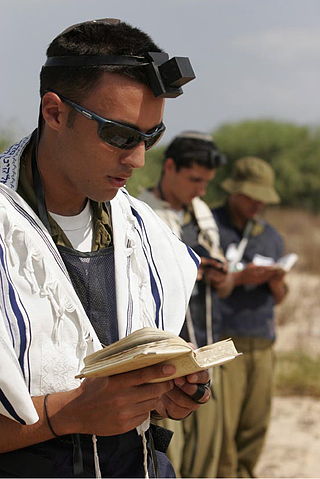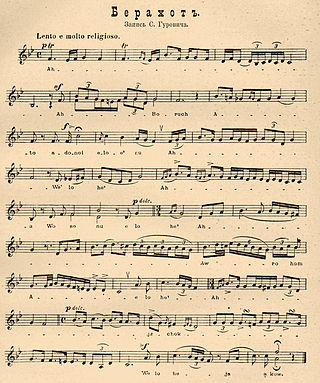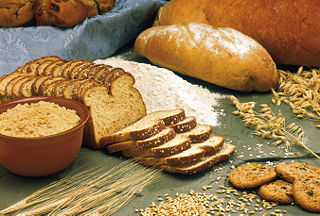Related Research Articles

Jewish prayer is the prayer recitation that forms part of the observance of Rabbinic Judaism. These prayers, often with instructions and commentary, are found in the Siddur, the traditional Jewish prayer book.

A siddur is a Jewish prayer book containing a set order of daily prayers. The word siddur comes from the Hebrew root ס־ד־ר, meaning 'order.'

The Amidah, also called the Shemoneh Esreh, is the central prayer of the Jewish liturgy. Observant Jews recite the Amidah at each of three daily prayer services in a typical weekday: morning (Shacharit), afternoon (Mincha), and evening (Ma'ariv). On Shabbat, Rosh Chodesh, and Jewish festivals, a fourth Amidah (Mussaf) is recited after the morning Torah reading, and once per year, a fifth Amidah (Ne'ilah) is recited, around sunset, on Yom Kippur. Due to the importance of the Amidah, in rabbinic literature, it is simply called "hatefila". According to legend, the prayer was composed by the rabbis of the Anshei Knesset HaGedolah. Accordingly, in Judaism, to recite the Amidah is a mitzvah de-rabbanan, i. e., a commandment of rabbinic origin.
Ahava rabbah is the name given in Ashkenazi Jewish custom to the blessing recited immediately before the Shema as part of the Shacharit (morning) prayer. The name is taken from the first words of the prayer.

Shacharit, or Shacharis in Ashkenazi Hebrew, is the morning tefillah (prayer) of Judaism, one of the three daily prayers.

In Judaism, the Ten Days of Repentance are the first ten days of the Hebrew month of Tishrei, beginning with the Jewish New Year Rosh Hashanah and ending with the conclusion of Yom Kippur. These days usually fall in September and/or early October.
In Judaism, Nusach is the exact text of a prayer service; sometimes the English word "rite" is used to refer to the same thing. Nusakh means "formulate" or "wording".

Birkat Hamazon, known in English as the Grace After Meals, is a set of Hebrew blessings that Jewish law prescribes following a meal that includes at least a kezayit (olive-sized) piece of bread. It is understood as a mitzvah based on Deuteronomy 8:10.
Tachanun or Taḥanun, also called nefilat apayim, is part of Judaism's morning (Shacharit) and afternoon (Mincha) services, after the recitation of the Amidah, the central part of the daily Jewish prayer services. It is also recited at the end of the Selichot service. It is omitted on Shabbat, Jewish holidays and several other occasions. Most traditions recite a longer prayer on Mondays and Thursdays.
Tzidkatcha is a prayer consisting of group of three verses that is recited during the afternoon prayer on Shabbat. It is said in memory of three righteous individuals who died on Shabbat: Joseph, Moses and King David. It is recited at this prayer in particular because these individuals died in the afternoon.
Sim Shalom is a blessing that is recited at the end of the morning Amidah and the Mincha Amidah during fast days in the Ashkenazic tradition, and on mincha of the Sabbath in the Western Ashkenazic rite and most communities in Israel; during the evening service and the Mincha service of non-fast days, a different version of this prayer, Shalom Rav, is said instead. In the Sefardic, Nusach Sefard, Nusach Ari, Italian Nusach and Romaniote rites, Sim Shalom is said at all prayer services. In Provence tradition, Shalom Rav was recited in all prayers.
Nusach Ashkenaz is a style of Jewish liturgy conducted by Ashkenazi Jews. It is primarily a way to order and include prayers, and differs from Nusach Sefard and Baladi-rite prayer, and still more from the Sephardic rite proper, in the placement and presence of certain prayers.
Baruch HaShem Le'Olam is a compilation of 18 verses from Tanach that is recited by some Jewish communities during weekday Maariv between Shema and Amidah. Its name is from the first 3 words of the first verse.

Maariv or Maʿariv, also known as Arvit, or Arbit, is a Jewish prayer service held in the evening or night. It consists primarily of the evening Shema and Amidah.
Yotzer ohr, also known as Birkat yotzer or Birkat Yotzer Or, is the first of the two blessings recited before the Shema during Shacharit, the morning religious services of Judaism.
Minhag Morocco refers to the religious customs adopted by Moroccan Jewry, from the Hebrew "Minhag", or custom. Although in the Middle Ages, there was a unique Nusach Morocco, unrelated to Sephardic liturgy, this original minhag has not been practiced since shortly after the Expulsion of Jews from Spain, and it is not well documented. Since this time, the Moroccan rite has been a subset of the Sephardic rite, but with certain customs of its own. Many sources contributed to and influenced the development of Moroccan religious customs, including the Shulchan Aruch, the Livorno minhag, the Ashkenazic minhag and even the presence of the Chabad-Lubavitch movement in Morocco. Minhag Morocco can be considered a sub-class within the Sephardic minhag but has many differences and unique traits. A related concept that falls under Minhag Morocco is the Moroccan Nusach, which more specifically refers to the variations in the prayer service.
The Baladi-rite Prayer is the oldest known prayer-rite used by Yemenite Jews, transcribed in a prayer book known as a tiklāl in Yemenite Jewish parlance. "Baladi", as a term applied to the prayer-rite, was not used until prayer books arrived in Yemen in the Sephardic-rite.

The Italian Nusach is the ancient prayer rite (nusach) of the long-standing Italian Jewish (Italkim) community on the Italian Peninsula, used by Jews who are not of Ashkenazi or Sephardic origin.
"Yom le-yabbashah" is a piyyut composed by Rabbi Yehuda Halevi for the seventh day of Passover, focusing mainly on the splitting of the Red Sea during the exodus from Egypt. The piyyut is recited as part of the blessings of the Shema prayer, and it is also sung in some communities at the festive meal of the Brit Milah.
"Shene Zetim" is a piyyut by Rabbi Solomon Ibn Gabirol of the Me'orah type, intended to be recited as part of the blessing of Yotzer ha-me'orot. The piyyut is customary recited on the Sabbath of Chanukkah in both Western and Eastern Ashkenazic rites. Despite Rabbi Shlomo Ibn Gabirol being a Sephardic poet, this piyyut has been preserved only in Ashkenazic communities.
References
- ↑ The Siddur companion By Paul H. Vishny, page 702
- ↑ The World of Prayer: Commentary and Translation of the Siddur By Elie Munk, page 13
- ↑ The Complete Artscroll Siddur, page 336
- ↑ As it appears in the Siddur of the Rambam.
- ↑ As it appears in Sephardic and Yemenite siddurim.
- ↑ Romaniote Machzor, Venice 1523.
- ↑ Shimon Fogel and Uri Erlich, Le-toldot nusḥah ha-ḳadum shel birkat hashkivenu.